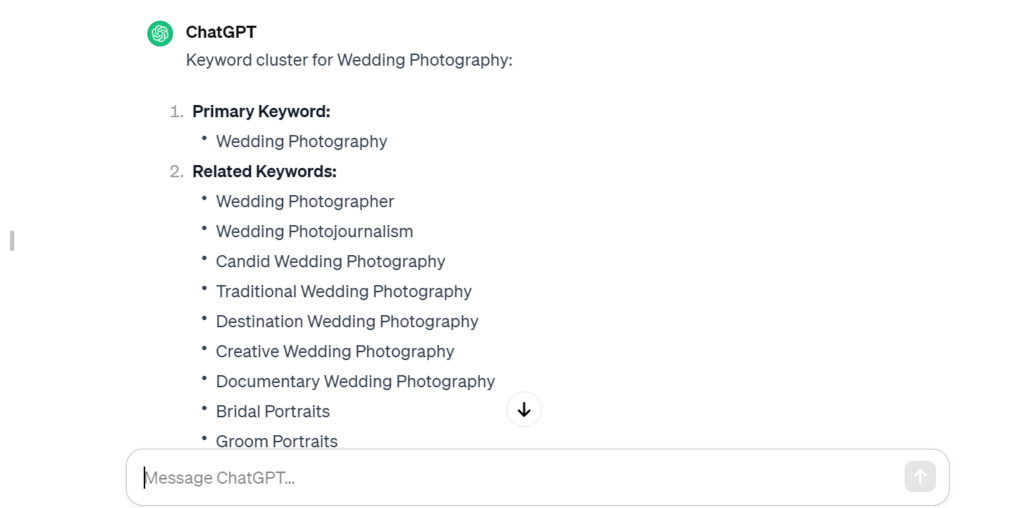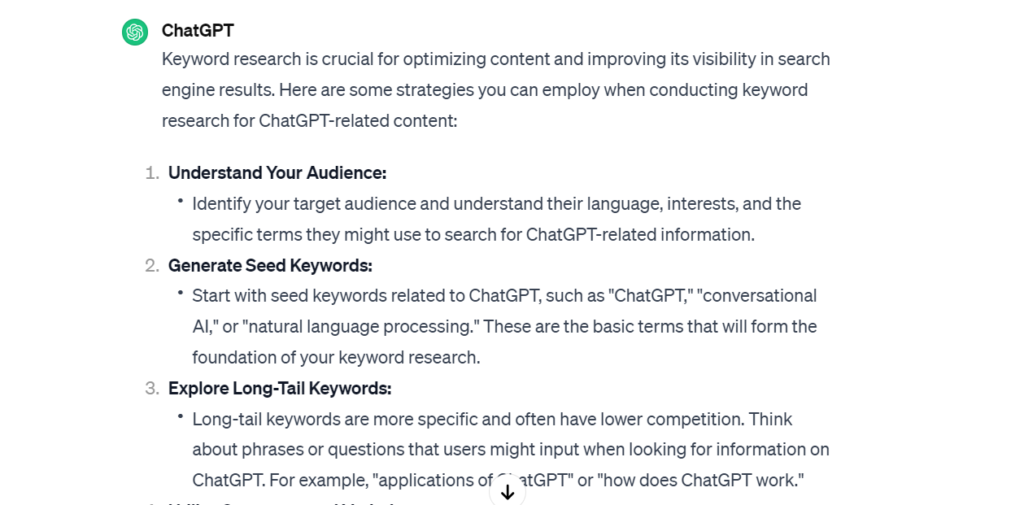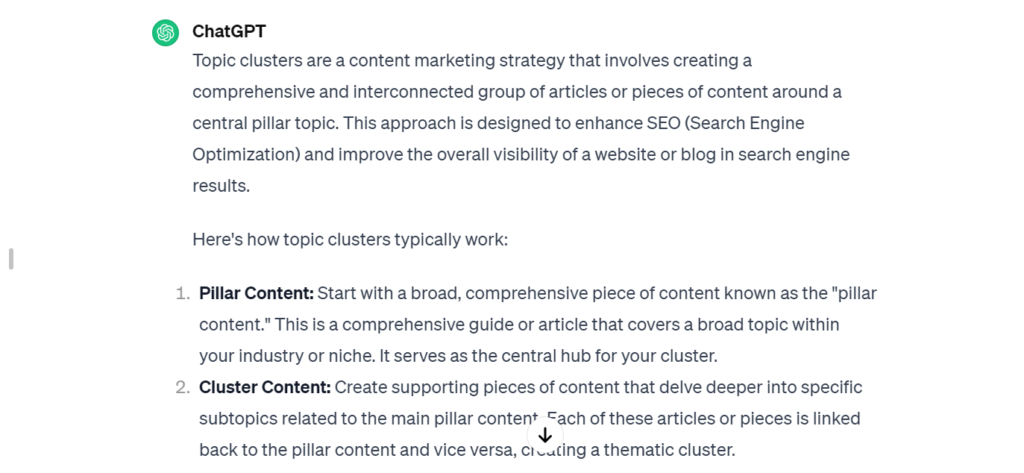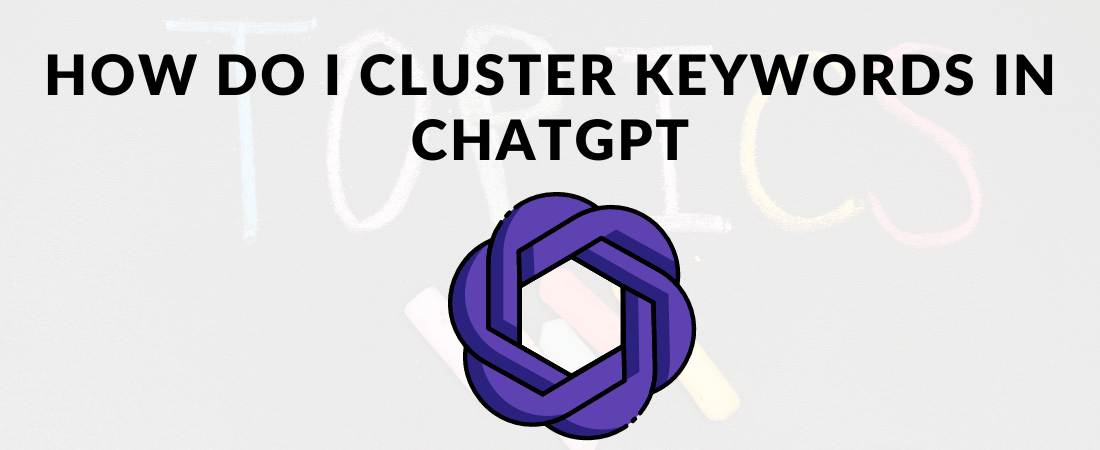Keyword clustering is an essential part of search engine optimization (SEO). It helps improve the visibility of your content by grouping similar keywords into clusters. However, manually clustering keywords can take several hours, making it a time-consuming process. ChatGPT can help streamline the keyword clustering process. In this article, we’ll take a closer look at what keyword clustering is, how ChatGPT can aid in the process, and provide prompts to help you cluster keywords.
Want to learn more about effective SEO? Check out this detailed article on topical maps to be a topical authority master.
Understanding Keyword Clustering

Keyword clustering is a potent SEO strategy. Essentially, it’s an SEO method where you categorize similar keywords into clusters. The related keywords are grouped together to improve content relevancy and site structure, addressing related topics more cohesively. Using keyword clustering, your content becomes more topic-driven rather than being solely keyword-based, which significantly enhances your SEO efficacy.
The keyword clustering process starts with keyword research, identifying related keywords important for your topics. Following this, you cluster the relevant keywords, whereby each cluster communicates a unique topic. In effect, the keywords within each cluster are closely related, highlighting your research strategy’s effectiveness.
Let’s consider the subject of ChatGPT. If you are looking to cluster keywords in ChatGPT, for instance, you’d gather related keywords about this topic, then carry out your research, assessing the related keywords and how they contribute to the content. From there, the goal is to structure them into their respective clusters, allowing you to provide informative content while improving your SEO tactics.
How To Create Keyword & Topic Clusters

Creating effective keyword and topic clusters is crucial for SEO success, but it can seem daunting if you don’t know where to start. Not to worry – with a few key steps, you’ll be clustering keywords like a pro in no time.
Brainstorm Broad Topics
First, brainstorm a list of broad topics related to your business. These will serve as the basic categories you’ll organize more granular keywords under later.
For a wedding photography business, broad topics might include:
- Wedding photography
- Wedding photo editing
- Wedding albums
- Engagement photography
- Expand with Specific Keywords
- Next, expand each broad topic with very specific keywords that potential customers would search for.
For “wedding photography,” additional keywords could include:
- destination wedding photography
- beach wedding photography
- urban wedding photography
- LGBTQ wedding photography
Get as niche as possible here – long-tail keywords with multiple words tend to convert better because they indicate a user’s specific intent.
Cluster Keywords by Intent
Now, cluster keywords with similar intent under the appropriate broad topics. This allows you to organize keywords by relevancy.
For example, put keywords like “wedding photo retouching” and “wedding photo effects” under “wedding photo editing.”
Audit and Expand Clusters
Finally, audit your clusters to identify any gaps, and expand where you can. Setting up keyword/topic groups takes time, but the payoff from an optimized site architecture is immense
Master the Cluster of Console Keywords in Google Search with ChatGPT
Mastering the cluster of console keywords in Google Search with ChatGPT is a crucial skill set that can propel your SEO & content strategy. ChatGPT, a machine learning model, effectively helps you sort out your console keywords. This involves grouping similar keywords together, so when you type these into Google Search Console, it increases the effectiveness of your search strategies. ChatGPT’s application of clustering keywords in Google Search essentially draws on its ability to understand the underlying relationships between keywords.
You need a prompt and a list of keywords for ChatGPT to work with liek this: “Organize the following keywords into groups based on their semantic relationships, and give a topics to each group.”
Through ChatGPT’s technique, understanding the importance of each keyword cluster becomes more straightforward, thus significantly enhancing your site’s visibility. ChatGPT assists you to find the connections between varying keywords faster and more efficiently than traditional methods. The use of keyword clusters can help you identify opportunities and create robust SEO campaigns targeting multiple related keywords.
Indeed, the power of ChatGPT is its capability to add value to not just one keyword, but a whole cluster of console keywords. To fully harness this, all you need to do is feed it the right console keywords and watch it unfurl the potentials of your Google Search strategies. So, next time you’re trying to find a way to conquer your keyword woes, you know who to get in touch with – it’s ChatGPT.
Strategize Your Keyword Research in ChatGPT: Apprehending Keyword Clustering

Unlocking the power of ChatGPT for keyword research involves strategizing your approach to apprehend all potential keywords that can drive noteworthy traffic to your content. Keyword clustering is not just dropping in keywords; it’s about making them work in synchronization to generate maximum reach. The robustness of ChatGPT allows the seamless integration of keyword research strategies, including keyword clustering, into your methodology. Utilizing SEO principles effectively in your research is the linchpin in generating captivating and engaging content. By considering each keyword as an integral part of a larger cluster, you start to see connections and patterns that weren’t evident when you analyzed them individually.
ChatGPT is a cutting-edge AI language model that can help in clustering keywords more effectively. It’s an open-source language model that uses natural language processing (NLP) and machine learning techniques to understand the context of the text. It can suggest the topics related to a given keyword and group it with similar phrases/words that have similar intent. This technology can save considerable time and effort while refining the SEO strategy to maximize visibility and attract more potential customers.
With this understanding, the combination of ChatGPT and clustering serves to strengthen your content generation efforts. This technique is particularly beneficial for SEO, as it enables your content to be found by a broader range of search queries. With ChatGPT’s assistance, your keyword research process becomes two-fold: you’re not just looking for individual high-ranking keywords but those that work together in a cluster. This is the essence of a well-executed content research strategy using ChatGPT: mastering the art of keyword clustering for amplified results.
Heighten Your Reach: The Impact of Word Clusters and Console Keywords in Google Search

The world of AI has offered us numerous ways to enhance our reach and among these exceptional tools is ChatGPT. Designed to provide impactful word clusters for your content, ChatGPT has now become vital to the strategies of influencer marketing, identify important clusters, phrases and console keywords that can escalate the reach of your content on Google search.
Keyword Clustering is about creating topic clusters that group closely related words, providing a new way to learn and analysis the main keywords. Popular among marketing professionals, this kind of development in AI bridges the gap between various phrases and related words- enhancing the effectiveness of your marketing strategies. By using topic clusters, you generate a wider reach on Google. This is important when considering valid content that appeals to Google search.
Start Clustering Your Keywords With ChatGPT today
Keyword clustering helps boost SEO by grouping similar keywords together. Generating keyword clusters can be a time-consuming process, which is where ChatGPT comes in- to streamline the process. The AI-powered platform can save you a considerable amount of time and can be an essential tool to improve your website’s organic rankings. By introducing your keywords to ChatGPT, it’s clustering algorithm can provide prompt output clusters and data analysis. Take these clustered groups and implement them into quality content creation for better results. Use ChatGPT to enhance your keyword clustering practice and improve your SEO strategy.
Is Keyword Clustering Really Worth All of the Work?
“Is keyword clustering really worth all the work?” An excellent question for any website owner. Sure, creating lots of “keyword clusters” and “topic groups” can be tedious, but the payoff can be huge.
Why? Because keyword clusters help you:
- Target more long-tail and buyer-intent keywords – If you want to rank for “best wedding photographer venice beach,” those words need to appear naturally together on your site. Clusters make that targeting almost effortless.
- Organize your site architecture – Group all your “photo editing” related content together, and your “destination wedding” content in another section. Keyword clusters almost create your site structure for you.
- Optimize for semantic search – When you group closely related keywords and topics, you send clear relevancy signals to search engines. This improves rankings for concepts, not just text searches.
- Identify content gaps – Empty or sparse clusters reveal areas you need more content around. Keyword clustering informs your content strategy.
- Satisfy searcher intent – Someone searching for “full wedding photo album options” has more specific intent than someone googling “wedding photographer.”
Well-organized clusters can get them the right content fast. So while clustering keywords is time-intensive on the front end, keep your eyes on the long-game ROI.
Some tips to make it more manageable:
- Break it into small sessions over time
- Start with a single service or product category
- Use free tools like AnswerthePublic, UberSuggest, and Google Keyword Planner to generate keyword ideas
- Create a living document you continually add to
The work pays dividends in site optimization and conversion boosts down the road. So while tedious, keyword clustering is absolutely worth the effort! Just pace yourself. ?

